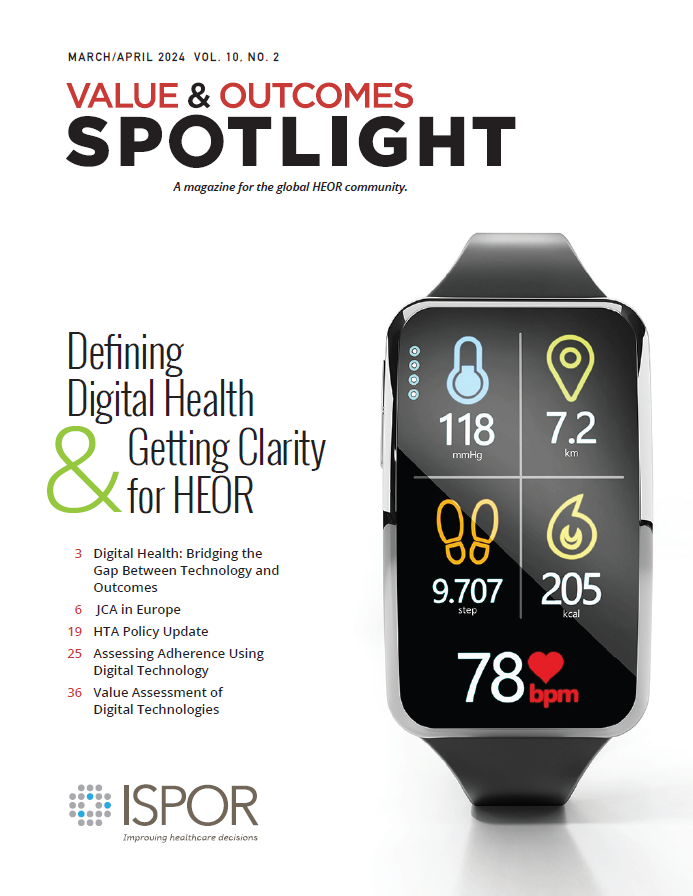Research Roundup
Section Editor: Aakash Bipin Gandhi, BPharm, PhD, Health Economics and Value Assessment Business Partner, Sanofi, Cambridge, MA, USA
Economic evaluation of digital health interventions: methodological issues and recommendations for practice. Gomes M, Murray E, Raftery J. Pharmacoeconomics 2022;40(4):367-378.
Summary
The article by Gomes et al provides a detailed understanding of the characteristics of digital interventions and its impact on methodological considerations for economic evaluation. Compared to standard technologies or medical interventions, the economic evaluation of digital technologies may require differing design considerations, choice of comparators, study perspectives, and methods for measuring model input parameters. Further, approaches for reporting the results of the analysis would also differ based on the approach adopted for the economic analysis of the digital intervention. Overall, the article provides key guidance to further grow and advance the understanding of methodologies for economic analysis of digital interventions.
Relevance
Compared to standard therapeutic interventions, the challenges associated with the economic evaluation of digital interventions are varied and still not well understood across the healthcare domain. A primary reason for this is the nature of digital interventions such as the need for user input on a constant basis, differential pricing, and rapid and dynamic evolution cycles compared to standard technologies. While still at its nascent stages, there is a need for focused development of standardized methodologies for the economic evaluation of digital interventions given their fast-growing relevance and importance for disease management and control.
Digital interventions in mental health: evidence syntheses and economic modelling. Gega L, Jankovic D, Saramago P, et al. Health Technol Assess. 2022;26(1):1-182.
Summary
This study by Gega et al uses a 4-step approach to evaluate the value of digital interventions for the management of mental health conditions. First, the authors identify and summarize sources of published economic evidence on digital health interventions for mental health conditions. Second, they synthesize clinical evidence associated with a single mental health condition (generalized anxiety disorder) to be used for constructing an economic model. Third, they build an economic model based on the collected economic and clinical evidence on generalized anxiety disorder. Fourth, the authors engaged with stakeholders to identify how they evaluate and perceive the value of digital interventions. The authors found that while digital interventions are cost-effective compared to nontherapeutic controls, their value in comparison to pharmacological therapy remains unclear. The economic model for general anxiety disorder showed that digital health interventions were associated with a lower net monetary benefit compared to medication therapy. In their interaction with stakeholders, the authors identified reduced wait times to receive care, ability to provide access to underserved populations, and maintaining continuous care as critical motivators for the adoption of digital interventions.
Relevance
The authors highlight the need to develop digital interventions than are not only less costly but also more effective than available alternatives for effective management of underlying disease conditions.
A framework for the economic evaluation of digital health interventions. Wilkinson T, Wang M, Friedman J, Prestidge M. World Bank Group. Policy Research Working Paper 10407. Accessed March 24, 2024.
https://documents1.worldbank.org/curated/en/099446504122313917/pdf/IDU0f639726d0f11404a3509af8054677649dcd6.pdf.
Summary
In this working paper, the authors describe a framework for determining the economic value of digital health technologies. The authors propose 5 key steps within their framework. First, the context or study perspective of the evaluation should be determined. Second, the appropriate evaluation type best suited to quantify the value of the underlying digital intervention should be selected. Third, the level of complexity associated with the evaluation approach should be determined. Fourth, the methodology associated with selected intervention should be determined. Fifth, the value proposition including uncertainties and impacts associated with the findings should be presented to decision makers.
Relevance
The proposed framework would help payers and policy makers understand the results of digital health economic evaluations in context of the transparently presented methodology to make informed decisions on reimbursement and approvals associated with digital health interventions, especially in low- to middle-income countries with constrained resources.
Note from the Section Editor: Views, thoughts, and opinions expressed in this section are my own and not those of any organization, committee, group, or individual that I am affiliated with.

